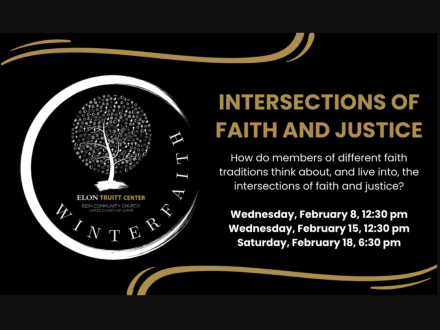During the Feb. 15 event, members of the Elon community spoke about their different faith traditions and how they live into intersections of faith and justice.
The Elon Community Church recently hosted a lunchtime panel session for students, faculty, and other members of the community to join and discuss their different traditions as part of the annual wInterfaith program. Specifically, they focused on the intersecting identities they possess and how that plays into faith, justice, and their day-to-day lives.
 The panel included Rev. Randy Orwig, senior pastor of the Elon Community Church and member of the Elon Town Council, Rabbi Geoffery Claussen, associate professor, Lori and Eric Sklut Scholar in Jewish Studies and chair of the Department of Religious Studies, and Sydni Brown, ’24, an Elon student studying strategic communications who is passionate about social justice, interfaith, intersectionality and her spiritual identity.
The panel included Rev. Randy Orwig, senior pastor of the Elon Community Church and member of the Elon Town Council, Rabbi Geoffery Claussen, associate professor, Lori and Eric Sklut Scholar in Jewish Studies and chair of the Department of Religious Studies, and Sydni Brown, ’24, an Elon student studying strategic communications who is passionate about social justice, interfaith, intersectionality and her spiritual identity.
The conversation ranged from religious misconceptions to day-to-day experiences, and the elements of all three panelist’s differing identities. The gathering on Wednesday, Feb. 15, was the second of three events for wInterfaith, an annual program that bring members of the community together to engage around different expressions of religion and spirituality.
“Many people believe that there is no intersection between religion and politics,” Orwig explained. “Obviously, what we’re seeing today is that it’s mixing in big ways. In fact, in so many ways that are creating dangerous kinds of products of religious understandings that are so warped away from what Christianity really is.”
Brown also had a similar take in the matter, with her perspective from the intersecting identities of an LGBT, African American spiritualist.
“It’s very skewed now,” Brown explained. “When people think about social justice and religion, they don’t think they connect, like you were saying. But I think when you really get down to the core of it and really think about it, it’s about understanding everybody’s differences and still being able to connect. I think that’s something I’ve definitely noticed with my peers. We’ve been able to recognize diversity, and not just leave it at that, but talk about it.”
Despite these positive connections, there is still a great need for change within the structured systems we still operate in today that can have a great effect on the road to achieve social justice, Claussen added.
“Social justice requires seeing how things can be different than the way that they are,” Claussen explained. “That can be hard to do when you’re in institutions that are benefitting from existing systems. Thinking about things imbedded at the structural level is really important. There’s great value, I think, in questioning as well as discussing and learning from others. I learn from my students all the time about questions to ask about the systems that exist in the world.”
The final wInterfaith event will be held Saturday, Feb. 18, at 6:30 p.m. in McKinnon Hall in Moseley Center as part of the student-led Ripple Conference. The discussion will center on reproductive justice across faith traditions.


